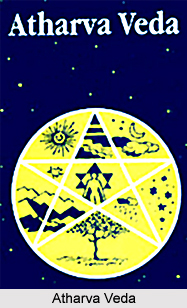 There exists a rather large class of magic hymns for Kings found in the Atharva Veda. These are intended for the needs and well being of the kings and while some of them are exorcism formulas some of them are benedictions. Every king was compelled, in India, from the earliest times, to have his own Purohita or family priest, and this family priest had to be familiar with the magic rites which refer to the life of a king (Rajakarmani or kings rites) and also with the songs and charms belonging to these rites. This indicates that the Atharva Veda is closely connected with the warrior caste.
There exists a rather large class of magic hymns for Kings found in the Atharva Veda. These are intended for the needs and well being of the kings and while some of them are exorcism formulas some of them are benedictions. Every king was compelled, in India, from the earliest times, to have his own Purohita or family priest, and this family priest had to be familiar with the magic rites which refer to the life of a king (Rajakarmani or kings rites) and also with the songs and charms belonging to these rites. This indicates that the Atharva Veda is closely connected with the warrior caste.
Among this category of songs are found songs which refer to the coronation of a king, when the king is sprinkled with the holy water and steps upon the tiger-skin. Apart from this there are found spells which are intended to ensure for the king mastery over other princes, and power and fame in general, prayer, for the king when he girds on his armour, when he ascends his war-chariot, and so on. There is an interesting prayer in the Atharva Veda to be said at the election of a king, in which the heavenly King Varuna appears as the one who chooses the king, the name of the god being brought into etymological connection with the verb `var,` to choose. A remarkable magic formula is that for the restoration of a banished king, is also found in the Atharva Veda.
Among the most beautiful hymns of this class are the battle-chants and magic songs of war, in particular the two songs to the drum, which is to call the fighters to the battle and to victory.
The Brahmins, however, were from the beginning much too practical a people to have used the magic charms always only in the interest of kings or other people, and not also for themselves. Among the magic incantations belonging to the "kings` rites" we already find a few which are concerned more with the Purohita, the indispensable family priest of the king, than with the latter himself. And although attacks on witchcraft and exorcisms are not lacking in Brahmanical literature, yet the law-book of Manu (XI, 33) says clearly and distinctly: "Without hesitation the Brahman shall make use of the sacred texts of the Atharva Veda; the word, indeed, is the weapon of the Brahman; therewith may he kill his enemies." Thus also in the Atharva Veda we find a whole series of magic incantations and exorcisms in the interest of the Brahmins. In these hymns the inviolability of the Brahmins and their possessions is repeatedly emphasized in the strongest manner, and the heaviest curses are pronounced against those who assail the property and lives of the Brahmins. Besides this, the mystical meaning of the Daksina, the sacrificial fee, is emphasized in the most extravagant expressions. The heaviest of all sins is to oppress Brahmins; the highest summit of piety is to give them liberal fees for sacrifice. These are the fundamental ideas running through all these songs, which are among the most unedifying of the whole Atharva Veda. Only a few of the better of these hymns contain prayers for enlightenment, wisdom, fame and theological knowledge. All songs belonging to this class might unhesitatingly be included amongst the latest parts of the Atharva Veda collection.













